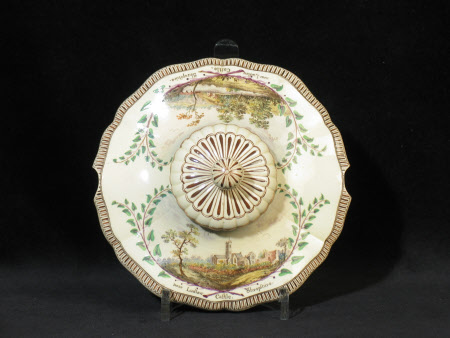Cover
Wedgwood
Category
Ceramics
Date
circa 1774 - circa 1775
Materials
Cream-coloured earthenware (Queen's ware), polychrome painted
Measurements
139 mm (Dia)
Order this imageCollection
Shugborough Estate, Staffordshire
NT 1270555.2
Summary
Separate cover for a Wedgwood and Bentley round cream bowl for a dessert, creamware (Queen’s ware), of lobed shape with spherical finial, painted in colours with named views of Ludlow Castle, Shropshire, wreathed in ivy with gadrooned and line borders in brown. The cream bowl and cover were made in Etruria, Staffordshire, and painted in the factory’s decorating studio in Cheyne Row, Chelsea, London, circa 1774-5.
Full description
Separate cover for a Wedgwood and Bentley round cream bowl for a dessert, creamware (Queen’s ware), of lobed shape with spherical finial, painted in colours with named views of Ludlow Castle, Shropshire, wreathed in ivy with gadrooned and line borders in brown. The cream bowl and cover were made in Etruria, Staffordshire, and painted in the factory’s decorating studio in Cheyne Row, Chelsea, London, circa 1774-5. The two images on the cover, which repeat the title ‘near Ludlow Castle, Shropshire’, are both based on details in an engravings by John Pye (b. 1745), after a drawing by Paul Sandby (1731-1809), published on 20 May 1774 in Francis Grose, 'The Antiquities of England and Wales', Volume III, London, 1772-6. The cover and its associated cream bowl have historically sat on two different Chinese hardwood stands, one circa 18th Century (see National Trust Inventory Number 1271547) and the other circa 20th Century (see National Trust Inventory Number 1271548), although neither stand is thought to be a component part of the bowl.
Provenance
The first mention of the Shugborough cream bowl and cover is in an undated valuation dating to the start of WWII, described as ‘Empress Catherine of Russia dinner service piece trial, Wedgwood sauceboat and stand, £50’. The long-forgotten Russian service was only re-discovered and popularized in a London exhibition in 1909, which brought similar examples on to the art market resulting in several sales of comparable material. It may have been acquired by Thomas Anson, 3rd Earl of Litchfield (1856-1918), who was keenly interested in family history, and corresponded with many authorities, including Francis "Frank" Hamilton Wedgwood (1863-1930), a descendent and partner in the firm, who assisted with the exhibition.
Marks and inscriptions
Inside cover: Historic NT Inventory Number: Shug/C/62
Makers and roles
Wedgwood, maker
